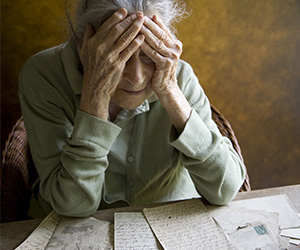We all fail to remember stuff at times, but when is forgetting a symptom of something far more serious? By Rebekah Kendal
 Recognition flits across the face of the elderly lady sitting on the couch as I enter the lobby. She smiles. It’s going to be a good day. I hold her hand as we begin our slow walk around the pretty gardens. I chat brightly about my week, family news and the flowers. She nods gently and occasionally tries to form a sentence.
Recognition flits across the face of the elderly lady sitting on the couch as I enter the lobby. She smiles. It’s going to be a good day. I hold her hand as we begin our slow walk around the pretty gardens. I chat brightly about my week, family news and the flowers. She nods gently and occasionally tries to form a sentence.
We bump into another elderly lady strolling through the gardens, to whom my companion introduces me as her daughter. I smile and let it slide. We stop and sit on our bench. I comment – as I do every week – on the golfers and the train. I show her pictures of my nephews and dogs on my phone. When I leave, she insists – as she has always done – on accompanying me on the walk to my car.
The woman I visit every week is my gran, but she is not the same woman who showed me how to knit or to make someone feel special on their birthday. She is not the same woman who would make us laugh by threatening to dance on the table at Christmas or the same woman who loved going to the movies with me.
My gran has dementia. It feels as if bits of what made her so special keep slipping away. I watch her struggle to do what she once did with ease, and it fills me with sadness. I wait patiently as she tries to piece words together to form a coherent sentence, and watch, feeling helpless, as she gets frustrated by her efforts. But then, when I hug her and stroke her hand, she’s still my gran and I’m grateful for the time we have.
What is dementia?
The most common form of dementia is Alzheimer’s disease, which is when ‘plaques’ and ‘tangles’ develop in the brain structure, leading to the death of brain cells. However, according to
Karen Borochowitz, Dementia SA’s executive director, there are more than 100 types of dementia, which include vascular dementia (the type that follows a stroke), Lewy body dementia (LBD), and a classification of dementia known as the fronto-temporal dementia.
Dementia is far more common in the geriatric population (roughly a quarter of people over the age of 85 have it), but it is not a normal part of ageing. It is considered a serious cognitive disorder, which is usually progressive and incurable. This means that the symptoms of the disease will get worse over time. The progression of dementia varies from one person to the next, but it is usually characterised by a decline in memory and reasoning, as well as communication skills. It’s believed to be caused by a varying combination of factors, such as genetics, lifestyle, age and overall health.
Treatment
With the exception of a handful of mostly reversible variants, dementia is an incurable disease. However, in the case of Alzheimer’s disease, there are a number of drug treatments that can delay the onset of symptoms in some people in the early-to-middle stages of the disease.
‘People with Alzheimer’s have been shown to have a shortage of the chemical acetylcholine in their brains,’ explains Karen. ‘The new drugs – Aricept, Exelon and Reminyl – work by maintaining existing supplies of acetylcholine. These drugs are not a cure, but may stabilise some of the symptoms of Alzheimer’s disease for a limited period of time.’
Diagnosis
There are a number of conditions that can be mistaken for dementia. Therefore, getting a proper dementia diagnosis will help a great deal to rule out these other conditions.
‘There is no straightforward test for dementia,’ says Karen. ‘A diagnosis is usually made by excluding a variety of other causes. The general practitioner or specialist will want to rule out the possibility of infections, a vitamin deficiency, thyroid problems, brain tumours, depression and the side effects of drugs.
‘The person being tested will be administered a blood test as well as a full physical exam. Their memory will be assessed, initially with questions on recent events and memories from
the past. They may also be given a detailed assessment of memory and thinking skills. A brain scan may also be carried out to give some clues as to the changes that are taking place in the person’s brain.’
While getting a diagnosis can seem scary, an early diagnosis will help you plan for the future and allow you to benefit from any treatments that may be available.
Treatment
With the exception of a handful of mostly reversible variants, dementia is an incurable disease. However, in the case of Alzheimer’s disease, there are a number of drug treatments that can delay the onset of symptoms in some people in the early-to-middle stages of the disease.
‘People with Alzheimer’s have been found to have a limited supply of the chemical acetylcholine in their brains,’ explains Karen. ‘The new drugs – namely Aricept, Exelon and Reminyl – work by
maintaining existing supplies of this chemical. These drugs are not a cure, but may stabilise some of the symptoms of Alzheimer’s disease for a temporary period of time.’
Early warning signs
• Lapses in memory – forgetting people, places or events
• Misplacing objects
• Difficulty finding the right words
• Disorientation in time and/or place
• Mood swings
• Withdrawal, loss of confidence, or problems communicating
• Difficulty with performing familiar tasks
• Declining personal hygiene
• Inappropriate behaviour
• Problems with planning and abstract thinking
• Changes in personality
• Loss of initiative.
Caring for someone with dementia
1. Don’t treat the person as if they are not there.
2. Don’t joke about inappropriate speech or behaviour.
3. Simplify tasks and limit choices.
4. Allow for things to take longer.
5. Give lots of reassurance.
6. Try as far as possible to stick to a regular schedule.
7. Keep the environment calm and soothing.
8. If you can’t figure out what is wrong, try to distract them with a new activity.
9. Arguing is counterproductive – where possible, go along with their reality.
10. Be patient – they are not intentionally ‘acting out’.
Get help
Dementia SA has social workers and counsellors who can help those affected by the disease. The organisation also offers a one-day training course, which costs R684 and covers a broad range of topics related to caring for someone with dementia. 021 421 0077, dementiasa.org







